International HRM: Impact on UK MNCs using Hofstede's Model Analysis
VerifiedAdded on 2020/02/24
|6
|1054
|63
Report
AI Summary
This report explores the effects of globalization on International Human Resource Management (IHRM), specifically focusing on UK-based multinational corporations (MNCs). It examines how globalization influences organizational culture and operations, with a particular emphasis on Hofstede's model of cultural dimensions. The report discusses the model's components, including individualism/collectivism, masculinity/femininity, power distance, uncertainty avoidance, long-term orientation, and indulgence versus restraint, and analyzes their impact on IHRM practices within UK MNCs. The analysis considers the challenges and opportunities that arise from cultural diversity, emphasizing the importance of effective communication, policy development, and adaptation to ensure successful global talent management. The report also highlights the need for UK MNCs to be mindful of cultural differences to foster a collaborative and productive work environment.
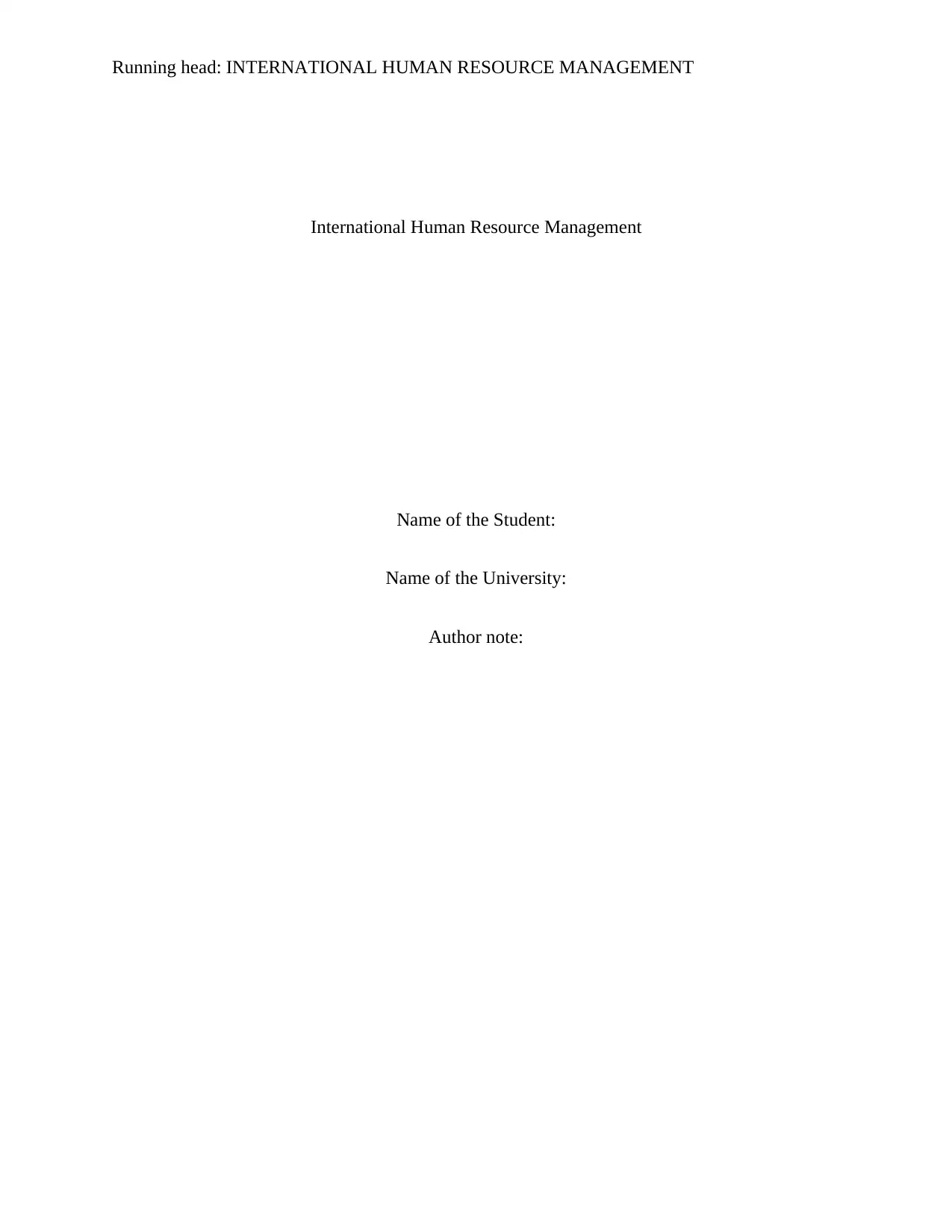
Running head: INTERNATIONAL HUMAN RESOURCE MANAGEMENT
International Human Resource Management
Name of the Student:
Name of the University:
Author note:
International Human Resource Management
Name of the Student:
Name of the University:
Author note:
Paraphrase This Document
Need a fresh take? Get an instant paraphrase of this document with our AI Paraphraser
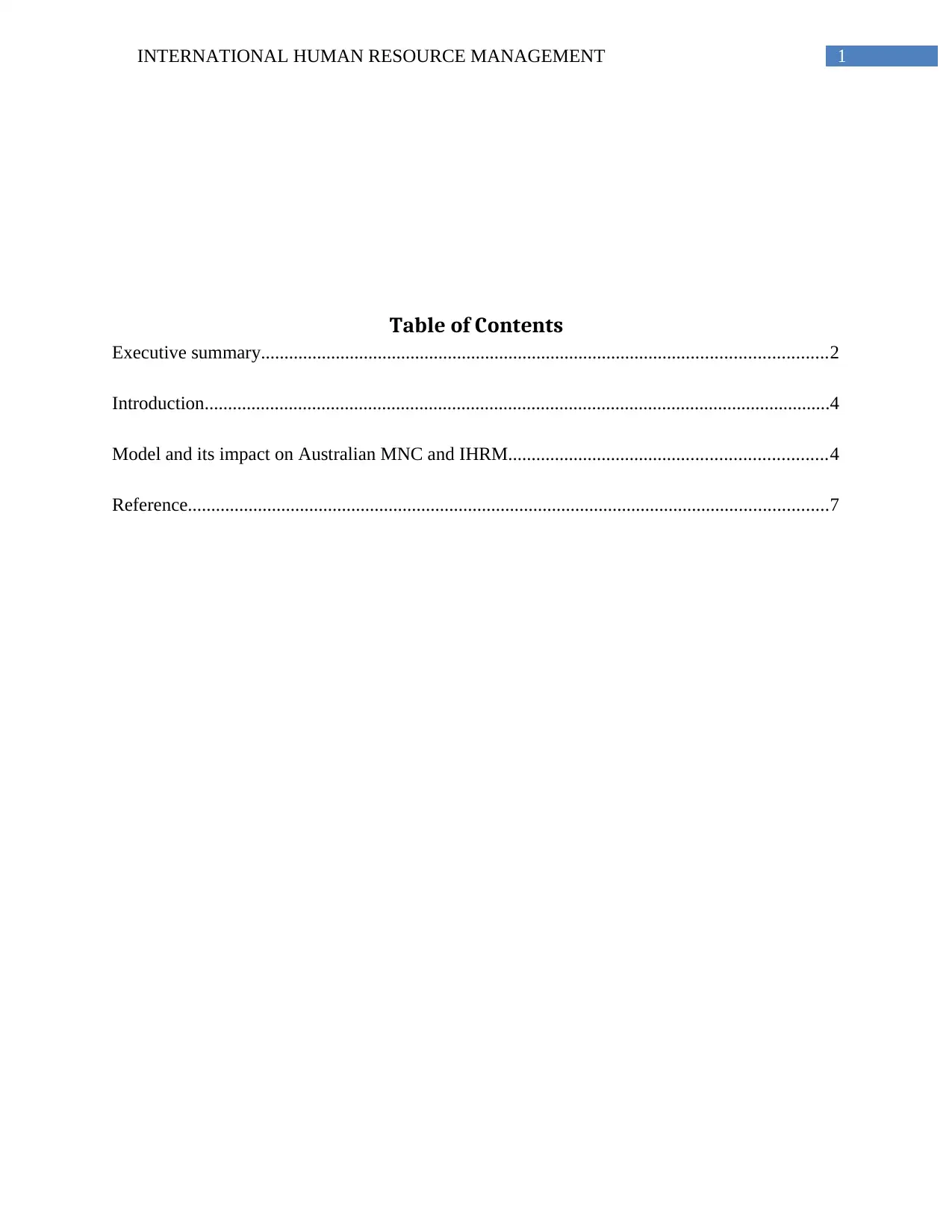
1INTERNATIONAL HUMAN RESOURCE MANAGEMENT
Table of Contents
Executive summary.........................................................................................................................2
Introduction......................................................................................................................................4
Model and its impact on Australian MNC and IHRM....................................................................4
Reference.........................................................................................................................................7
Table of Contents
Executive summary.........................................................................................................................2
Introduction......................................................................................................................................4
Model and its impact on Australian MNC and IHRM....................................................................4
Reference.........................................................................................................................................7
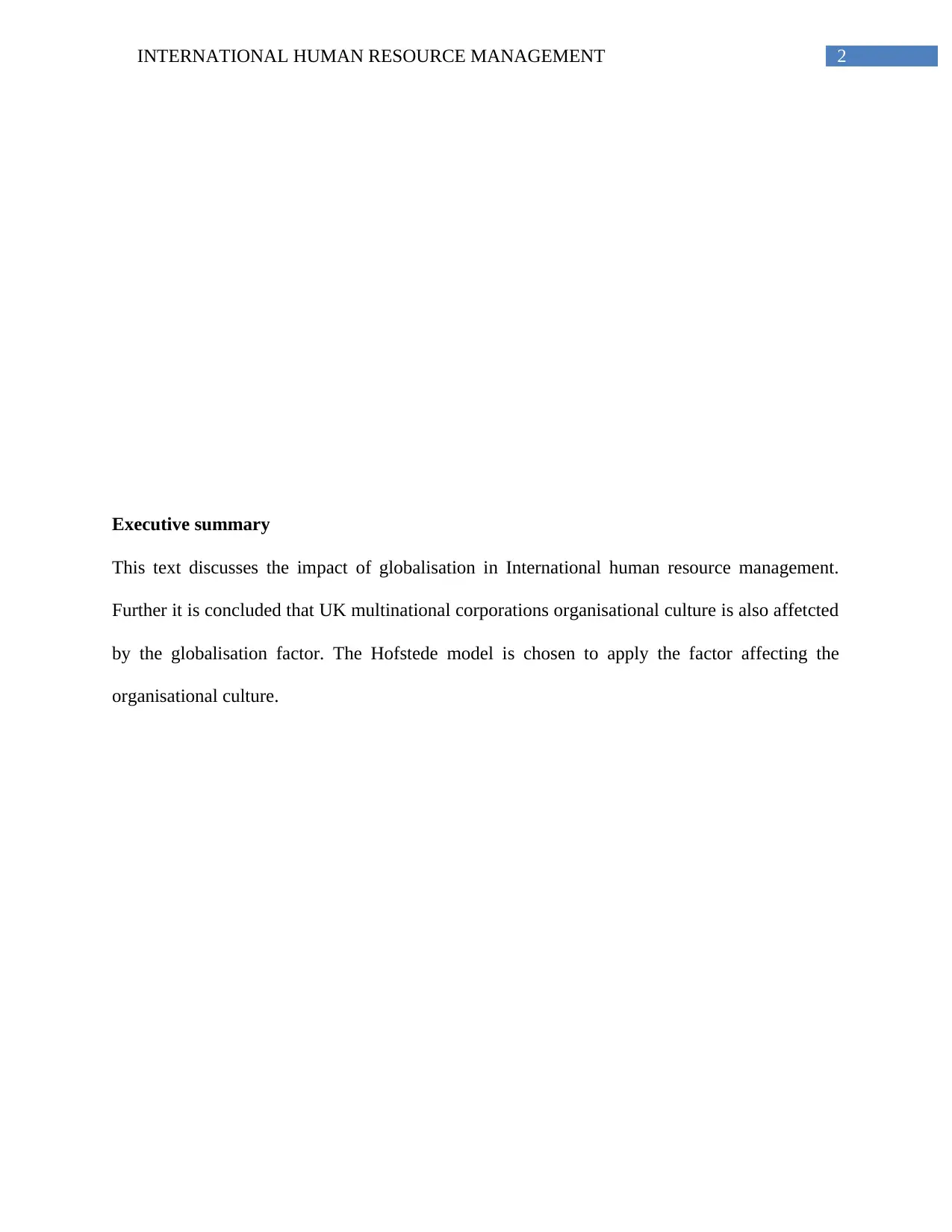
2INTERNATIONAL HUMAN RESOURCE MANAGEMENT
Executive summary
This text discusses the impact of globalisation in International human resource management.
Further it is concluded that UK multinational corporations organisational culture is also affetcted
by the globalisation factor. The Hofstede model is chosen to apply the factor affecting the
organisational culture.
Executive summary
This text discusses the impact of globalisation in International human resource management.
Further it is concluded that UK multinational corporations organisational culture is also affetcted
by the globalisation factor. The Hofstede model is chosen to apply the factor affecting the
organisational culture.
⊘ This is a preview!⊘
Do you want full access?
Subscribe today to unlock all pages.

Trusted by 1+ million students worldwide
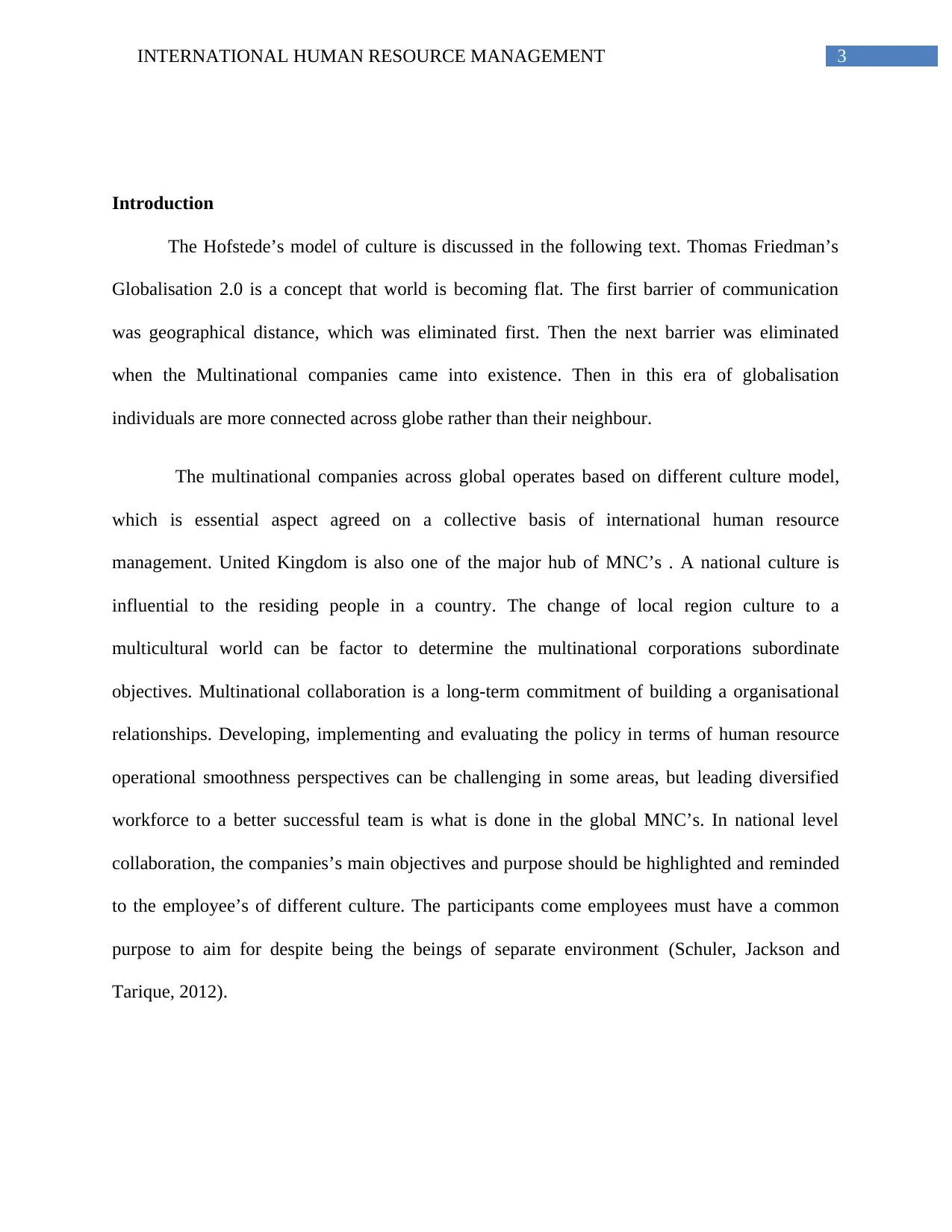
3INTERNATIONAL HUMAN RESOURCE MANAGEMENT
Introduction
The Hofstede’s model of culture is discussed in the following text. Thomas Friedman’s
Globalisation 2.0 is a concept that world is becoming flat. The first barrier of communication
was geographical distance, which was eliminated first. Then the next barrier was eliminated
when the Multinational companies came into existence. Then in this era of globalisation
individuals are more connected across globe rather than their neighbour.
The multinational companies across global operates based on different culture model,
which is essential aspect agreed on a collective basis of international human resource
management. United Kingdom is also one of the major hub of MNC’s . A national culture is
influential to the residing people in a country. The change of local region culture to a
multicultural world can be factor to determine the multinational corporations subordinate
objectives. Multinational collaboration is a long-term commitment of building a organisational
relationships. Developing, implementing and evaluating the policy in terms of human resource
operational smoothness perspectives can be challenging in some areas, but leading diversified
workforce to a better successful team is what is done in the global MNC’s. In national level
collaboration, the companies’s main objectives and purpose should be highlighted and reminded
to the employee’s of different culture. The participants come employees must have a common
purpose to aim for despite being the beings of separate environment (Schuler, Jackson and
Tarique, 2012).
Introduction
The Hofstede’s model of culture is discussed in the following text. Thomas Friedman’s
Globalisation 2.0 is a concept that world is becoming flat. The first barrier of communication
was geographical distance, which was eliminated first. Then the next barrier was eliminated
when the Multinational companies came into existence. Then in this era of globalisation
individuals are more connected across globe rather than their neighbour.
The multinational companies across global operates based on different culture model,
which is essential aspect agreed on a collective basis of international human resource
management. United Kingdom is also one of the major hub of MNC’s . A national culture is
influential to the residing people in a country. The change of local region culture to a
multicultural world can be factor to determine the multinational corporations subordinate
objectives. Multinational collaboration is a long-term commitment of building a organisational
relationships. Developing, implementing and evaluating the policy in terms of human resource
operational smoothness perspectives can be challenging in some areas, but leading diversified
workforce to a better successful team is what is done in the global MNC’s. In national level
collaboration, the companies’s main objectives and purpose should be highlighted and reminded
to the employee’s of different culture. The participants come employees must have a common
purpose to aim for despite being the beings of separate environment (Schuler, Jackson and
Tarique, 2012).
Paraphrase This Document
Need a fresh take? Get an instant paraphrase of this document with our AI Paraphraser
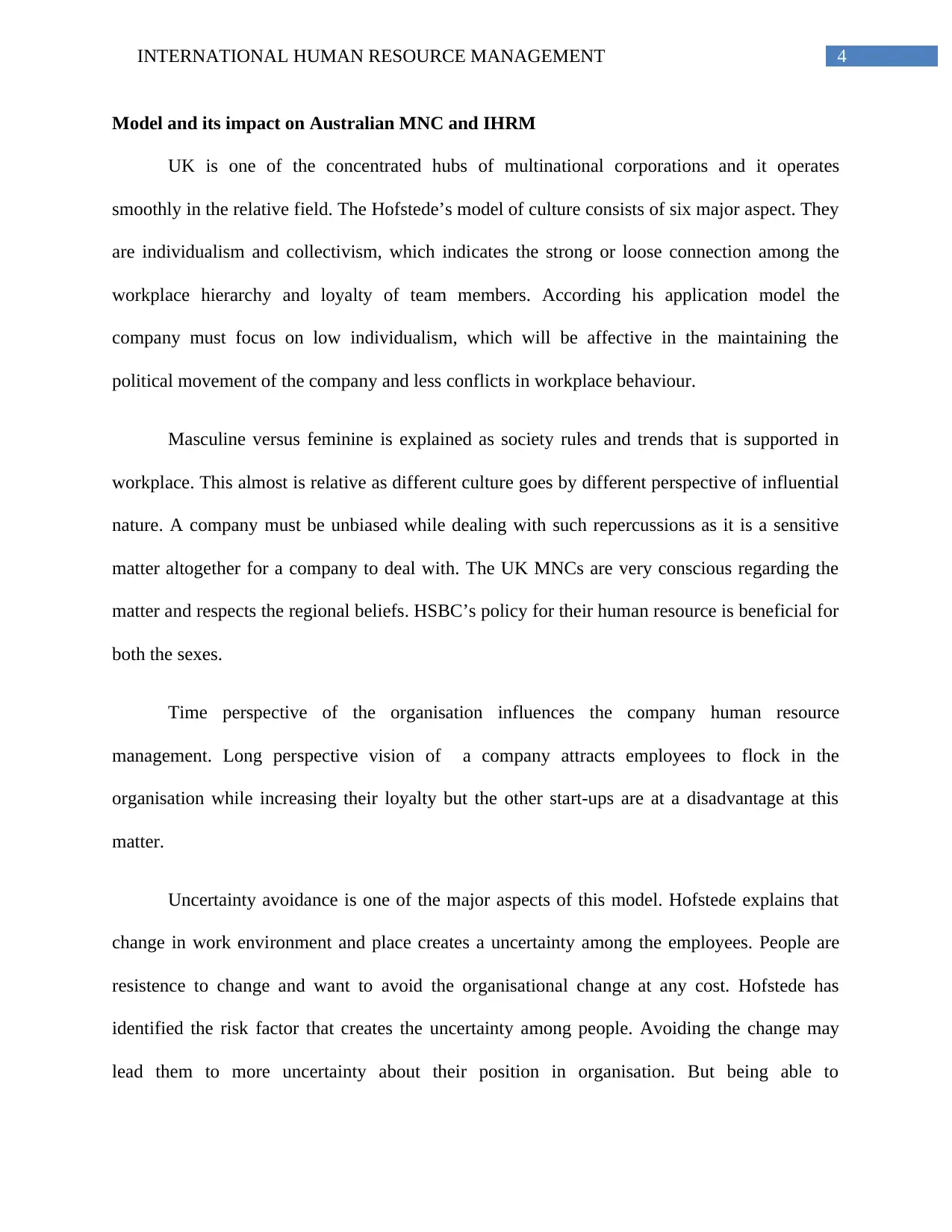
4INTERNATIONAL HUMAN RESOURCE MANAGEMENT
Model and its impact on Australian MNC and IHRM
UK is one of the concentrated hubs of multinational corporations and it operates
smoothly in the relative field. The Hofstede’s model of culture consists of six major aspect. They
are individualism and collectivism, which indicates the strong or loose connection among the
workplace hierarchy and loyalty of team members. According his application model the
company must focus on low individualism, which will be affective in the maintaining the
political movement of the company and less conflicts in workplace behaviour.
Masculine versus feminine is explained as society rules and trends that is supported in
workplace. This almost is relative as different culture goes by different perspective of influential
nature. A company must be unbiased while dealing with such repercussions as it is a sensitive
matter altogether for a company to deal with. The UK MNCs are very conscious regarding the
matter and respects the regional beliefs. HSBC’s policy for their human resource is beneficial for
both the sexes.
Time perspective of the organisation influences the company human resource
management. Long perspective vision of a company attracts employees to flock in the
organisation while increasing their loyalty but the other start-ups are at a disadvantage at this
matter.
Uncertainty avoidance is one of the major aspects of this model. Hofstede explains that
change in work environment and place creates a uncertainty among the employees. People are
resistence to change and want to avoid the organisational change at any cost. Hofstede has
identified the risk factor that creates the uncertainty among people. Avoiding the change may
lead them to more uncertainty about their position in organisation. But being able to
Model and its impact on Australian MNC and IHRM
UK is one of the concentrated hubs of multinational corporations and it operates
smoothly in the relative field. The Hofstede’s model of culture consists of six major aspect. They
are individualism and collectivism, which indicates the strong or loose connection among the
workplace hierarchy and loyalty of team members. According his application model the
company must focus on low individualism, which will be affective in the maintaining the
political movement of the company and less conflicts in workplace behaviour.
Masculine versus feminine is explained as society rules and trends that is supported in
workplace. This almost is relative as different culture goes by different perspective of influential
nature. A company must be unbiased while dealing with such repercussions as it is a sensitive
matter altogether for a company to deal with. The UK MNCs are very conscious regarding the
matter and respects the regional beliefs. HSBC’s policy for their human resource is beneficial for
both the sexes.
Time perspective of the organisation influences the company human resource
management. Long perspective vision of a company attracts employees to flock in the
organisation while increasing their loyalty but the other start-ups are at a disadvantage at this
matter.
Uncertainty avoidance is one of the major aspects of this model. Hofstede explains that
change in work environment and place creates a uncertainty among the employees. People are
resistence to change and want to avoid the organisational change at any cost. Hofstede has
identified the risk factor that creates the uncertainty among people. Avoiding the change may
lead them to more uncertainty about their position in organisation. But being able to
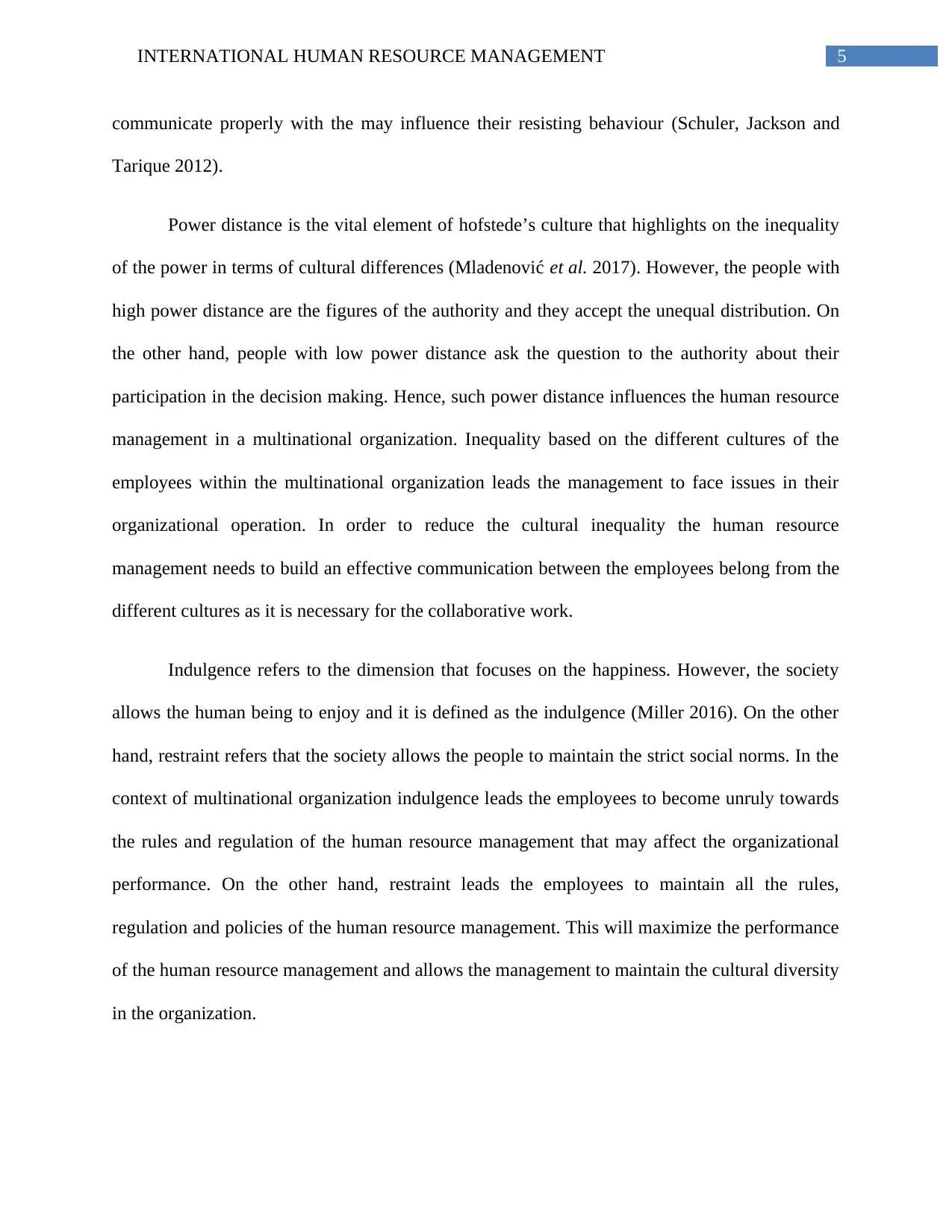
5INTERNATIONAL HUMAN RESOURCE MANAGEMENT
communicate properly with the may influence their resisting behaviour (Schuler, Jackson and
Tarique 2012).
Power distance is the vital element of hofstede’s culture that highlights on the inequality
of the power in terms of cultural differences (Mladenović et al. 2017). However, the people with
high power distance are the figures of the authority and they accept the unequal distribution. On
the other hand, people with low power distance ask the question to the authority about their
participation in the decision making. Hence, such power distance influences the human resource
management in a multinational organization. Inequality based on the different cultures of the
employees within the multinational organization leads the management to face issues in their
organizational operation. In order to reduce the cultural inequality the human resource
management needs to build an effective communication between the employees belong from the
different cultures as it is necessary for the collaborative work.
Indulgence refers to the dimension that focuses on the happiness. However, the society
allows the human being to enjoy and it is defined as the indulgence (Miller 2016). On the other
hand, restraint refers that the society allows the people to maintain the strict social norms. In the
context of multinational organization indulgence leads the employees to become unruly towards
the rules and regulation of the human resource management that may affect the organizational
performance. On the other hand, restraint leads the employees to maintain all the rules,
regulation and policies of the human resource management. This will maximize the performance
of the human resource management and allows the management to maintain the cultural diversity
in the organization.
communicate properly with the may influence their resisting behaviour (Schuler, Jackson and
Tarique 2012).
Power distance is the vital element of hofstede’s culture that highlights on the inequality
of the power in terms of cultural differences (Mladenović et al. 2017). However, the people with
high power distance are the figures of the authority and they accept the unequal distribution. On
the other hand, people with low power distance ask the question to the authority about their
participation in the decision making. Hence, such power distance influences the human resource
management in a multinational organization. Inequality based on the different cultures of the
employees within the multinational organization leads the management to face issues in their
organizational operation. In order to reduce the cultural inequality the human resource
management needs to build an effective communication between the employees belong from the
different cultures as it is necessary for the collaborative work.
Indulgence refers to the dimension that focuses on the happiness. However, the society
allows the human being to enjoy and it is defined as the indulgence (Miller 2016). On the other
hand, restraint refers that the society allows the people to maintain the strict social norms. In the
context of multinational organization indulgence leads the employees to become unruly towards
the rules and regulation of the human resource management that may affect the organizational
performance. On the other hand, restraint leads the employees to maintain all the rules,
regulation and policies of the human resource management. This will maximize the performance
of the human resource management and allows the management to maintain the cultural diversity
in the organization.
⊘ This is a preview!⊘
Do you want full access?
Subscribe today to unlock all pages.

Trusted by 1+ million students worldwide
1 out of 6
Related Documents
Your All-in-One AI-Powered Toolkit for Academic Success.
+13062052269
info@desklib.com
Available 24*7 on WhatsApp / Email
![[object Object]](/_next/static/media/star-bottom.7253800d.svg)
Unlock your academic potential
Copyright © 2020–2026 A2Z Services. All Rights Reserved. Developed and managed by ZUCOL.



